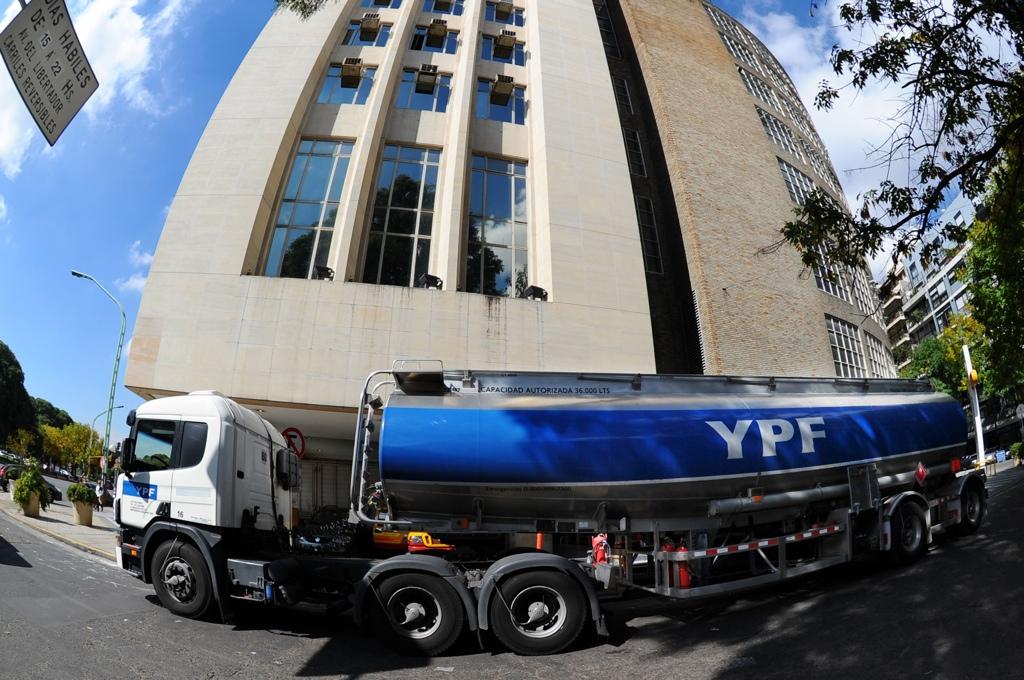Argentina wants its oil back
A truck carrying gasoline in downtown Buenos Aires on April 17, a day after Argentine President Cristina Fernandez de Kirchner announced YPF oil company, controlled by Spain’s Repsol, would be expropriated.
First off, it was supposed to be a Chinese firm that was going to buy that big oil company in Argentina. That would have raised some eyebrows.
But Argentina has outdone that would-be headliner.
President Cristina Fernandez de Kirchner announced her government plans to take control of oil and gas company YPF, ousting its major shareholder, Spanish energy giant Repsol.
Today, lawmakers began debating new legislation that would give the Argentine government 51 percent of controlling stake in YPF. The president’s Peronist party enjoys majorities in both houses of congress, so the bill is expected to pass.
Cue Spanish protest.
Madrid summoned the Argentine ambassador. Spanish Prime Minister Mariano Rajoy, cited by Reuters at the World Economic Forum in Puerto Vallarta, Mexico, said he felt “profound unease.”
Argentina is set to become "an international pariah," said Iñigo Mendez, Spain's secretary of state for European Union affairs.
Europe so far appears to have Spain's back. European Commission President Jose Manuel Barroso said Europe expects Argentine authorities to "uphold their international commitments and obligations" on their deal with Spain.
Repsol Chairman Antonio Brufao vowed to fight the move, in international courts if he had to. The company wants $10.5 billion in compensation.
Salting fresh wounds, the price of shares in Repsol YPF has tumbled, The New York Times reports.
But the nationalization bid reportedly has boosted spirits in Argentina.
Correction: Make that "renationalization." The Financial Times calls it “the biggest renationalization in the natural resources industry since the Russian government took control of Yukos in the early 2000s.”
Spain's Repsol bought YPF as part of an Argentine privatization effort in 1999, making the Spanish firm the world’s eighth-largest oil company.
President Fernandez de Kirchner’s administration blames YPF for an energy shortfall that is sucking up state spending. Energy imports increased by 113 percent in 2011 while subsidies to the energy sector are expected to exceed 4 percent of GDP this year, according to Eurasia Group, a risk consultancy.
YPF has said the government’s interventionist policies are to blame for the country's energy problems, the Wall Street Journal reports.
Haven’t we been here before? Analysts were not remiss to make the link to other South American nationalization efforts, namely by Venezuela’s Hugo Chavez.
“Mrs. Kirchner is now running close to Mr. Chavez’s model,” Boris Segura, an analyst at the New York investment bank Nomura, told the Christian Science Monitor.
As the Financial Times beyondbrics blog points out, this could be just one in a spate of recent state intervention bids, including cases in Ecuador and Mongolia — both, incidentally, involve deals with China.
The blog cites Fernandez de Kirchner offering her reasoning — safety in numbers?
“The United Arab Emirates control 100 percent of their oil and gas industry; the same with China, Iran, Venezuela, Uruguay, Chile, Ecuador, Mexico, Malaysia and Egypt among many others. Colombia holds a 90 percent stake, Russia’s Gazprom holds a 50 percent stake [in gas], Brazil [has a 51 percent government stake] in Petrobras. So this is not something we came up with one day and all of the sudden.”
The takeover could deepen Argentina’s energy woes, writes Latin America analyst Daniel Kerner, of Eurasia Group, in a report. More investment in a nationalized oil company is not likely the remedy. It won't do much to halt a decade of decline in reserves and production. Nor will it calm jittery investors.
Kerner expects the bill could become law within four weeks. But the lawsuits could draw this out. Spain — downtrodden as it is — probably won't back down easy.
Every day, reporters and producers at The World are hard at work bringing you human-centered news from across the globe. But we can’t do it without you. We need your support to ensure we can continue this work for another year.
Make a gift today, and you’ll help us unlock a matching gift of $67,000!
